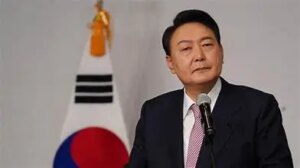South Korea’s Unprecedented Martial Law Declaration: A Political Crisis Unfolding

In a move that has sent shockwaves throughout South Korea and the international community alike, President Yoon Suk Yeol recently declared an “emergency martial law.” The announcement, made with little explanation, sent the nation’s Parliament into turmoil, raising alarming questions about the state of democracy in South Korea.
A Declaration Shrouded in Controversy
President Yoon’s declaration came amidst growing fears of potential impeachment led by the opposition party. Claiming the need to “safeguard a liberal South Korea from threats posed by North Korea’s communist forces,” Yoon positioned his move as a protective measure for the nation and its democratic values. However, what unfolded next resembled more of a political Pandora’s box than an exercise in governance.
Bedlam in the National Assembly
In an astonishing display of resistance, members of Parliament quickly overturned the martial law declaration—within only three hours. The session devolved into chaos, with one member even live-streaming himself climbing the gates of the assembly to ensure his vote against the president’s decree. The sight of police and military personnel standing bewildered outside the Parliament sent a strong message: the very fabric of South Korean democracy was under siege.
Economic Fallout and Global Concerns
The implications of Yoon’s martial law declaration extended beyond politics; they significantly impacted South Korea’s economy, causing a sharp decline in stock markets as investor confidence plummeted overnight. International powers, particularly the United States, quickly reached out to Seoul, expressing a lack of prior warning regarding the martial law.
Yoon initially viewed the martial law as a means of curtailing impeachment proceedings, but the backlash appears to have left him in a precarious position. With the National Assembly now fiercely opposed to his actions, the possibility of retaining power seems increasingly unlikely, leaving many to wonder how he can navigate this political quagmire.
Public Outcry and Dwindling Support
Despite Yoon’s assertions that his actions would protect the people, public opinion tells a different story. A Gallup Korea poll conducted last month showed a staggering 72% disapproval rate for the president, with only 19% expressing support. Furthermore, a grassroots online petition demanding his immediate removal garnered over 811,000 signatures. It is clear that the tides of public sentiment are turning against him.
As Yoon scapegoated the National Assembly, calling it a “haven for criminals,” his perception of opposition as a threat to public safety only exacerbated tensions. Critics firmly believe that this desperate maneuver is indicative of a leader more focused on preserving his power than serving the country’s democratic ideals.
The Dystopian Future?
Opposition leader Lee Jae-myung articulated the severity of the situation, warning that if martial law continued, it might lead to military rule enforced by tanks and armored personnel carriers. His urgent appeal to the military, stating that any orders stemming from the president’s declaration would violate constitutional law, sparked further worries about the nation’s stability.
This political crisis does not merely signify a struggle for power; it reflects a crucial crossroads for South Korea as it grapples with maintaining its democratic integrity in the face of authoritarian tendencies.
What Lies Ahead?
At Extreme Investor Network, we recognize the critical importance of these developments not only for South Korea but for the global geopolitical landscape. As market commentators and economic analysts, we’d like to highlight that the unfolding situation could have severe ramifications for foreign investments, bilateral relations, and regional stability.
History is often a teacher, and with Socrates’ ominous predictions for 2024 resonating in the air, the political terrain in South Korea promises to be tumultuous in the weeks to come. As citizens rally for change and global powers observe closely, the question remains: will South Korea emerge from this crisis with its democracy intact, or are we witnessing the beginning of a more profound political transformation?
As events unfold, we encourage our readers to stay informed and engaged with our content here at Extreme Investor Network for expert analyses and insights on this pivotal moment in South Korea’s history. Subscribe for timely updates as we navigate these changing tides in international and economic relations together.

